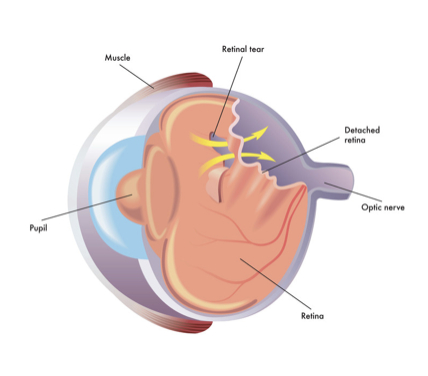
Eye injuries in combat sports
Why do I see floaters?
When should I see a doctor for an eye injury?
Anatomy: The eye is a an oblong sphere containing muscles to direct the gaze, nerves to send signals based upon colors and shapes of objects, blood vessels to provide nutrients and a pupil and iris to allow light to enter. Being able to visualize your opponent, read their movements and even gauge how fatigued they are is important for gaining an advantage.
Fights should be immediately stopped if the competitor is unable to see from the eye. This includes swelling around the socket, blood from a laceration entering the eye or a corneal abrasion causing significantly blurred vision. Oftentimes blunt trauma to the eye may have you seeing “floaters”; less severe abrasions resolve within 3 days. However, if you see “floaters” and lose peripheral vision in the eye after being struck, you should seek medical attention immediately as you may have a severe corneal abrasion.
Injury: It is especially important for combat sport athletes to ensure proper care of their eyes. It is recommended that they undergo yearly dilatation to detect subtle changes that may result in permanent, lifelong complications if not addressed in a timely manner. Blows to the head can cause early onset glaucoma (due to increased pressure on the optic nerve); cataracts (clouding of vision over the lens blocking light entry); corneal abrasion (contact with foreign object, possible infection); and retinal detachment, holes or tears (loss of peripheral vision, onset of floaters).

Prevention & Treatment: Since there are no exercises to strengthen the soft tissue of the eye, proper use of equipment is a must. Hall of Famer Pat Miletich recommends using MMA gloves for grappling but full boxing gloves during striking practice. This will reduce the possibility of unintentional eye-poking when training which may cause a corneal abrasion.
Treatment of retinal tears or holes with laser surgery may require more than a month away from engaging in activity with aggressive head contact (pretty much all MMA practices). Cataract surgery sometimes takes more than 4 months to recover. Retinal detachments have a 90% successful correction rate if treated within the first week of injury.